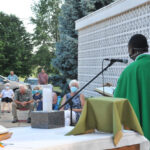By Barb Arland-Fye
A photograph of a mother helping her malnourished son to stand after he collapsed near their hut in a Kenyan village brings to mind Paul’s message to the Corinthians about the meaning of love. The boy, about 8 years old, appears utterly exhausted. A little girl, probably his sister, watches solemnly, standing next to her mother and brother.

The image accompanies a story in America magazine (July/August 2022) about an unprecedented global hunger crisis fueled by drought, the ongoing COVID-19 pandemic, the Russian war on Ukraine, supply chain breakdowns and other challenges. My heart aches for the family in that photo, especially the mother who conveys the self-giving love modeled by Christ.
“Love is patient, love is kind,” Paul tells us. “It bears all things, believes all things, hopes all things, endures all things” (I Corinthians 13:1-13). The Kenyan mom is enduring something I never endured, the inability to provide adequate nourishment for her child — through no fault of her own — and watching helplessly as he struggles to survive.
What mother, though, hasn’t experienced Paul’s description of love — “It bears all things, believes all things, hopes all things, endures all things?” When my older son Colin was an infant, he became seriously ill and was hospitalized. As I kept vigil, gently stroking him as he lay in a medical crib, a nurse told me, apologetically, to stop because my physical contact would elevate his dangerously high temperature. I could not protect my child from pain, which filled me with anguish.
When our younger son, Patrick, was born, I felt a sense of hope after a tough year struggling to accept the permanency of Colin’s autism. Through their childhoods, I experienced what Paul meant about love. Take for example, my attempts to convince Patrick to practice his bass clarinet or to accept my wisdom. A stubborn, sensitive child, he tested my commitment to “love is patient,” as did Colin with some of his quirkier rituals.
“Mothers are the strongest antidote to the spread of self-centered individualism,” Pope Francis says. “It is they who testify to the beauty of life. Certainly a society without mothers would be dehumanized, for mothers are always, even in the worst of times, witnesses to tenderness, dedication and moral strength” (“The Joy of Love,” “Amoris Laetitia”).
Pope Francis also “praised mothers for the ‘heroism’ they show ‘in self-giving, strength in compassion, wisdom in meekness,’ saying they are people who know how to take their children by the hand and ‘lovingly introduce them to life’” (CRUX, Jan. 1, 2019).
The Kenyan mother’s hands grasp the underarms of her son as she lifts him up. I can’t see the expression on her face because she is leaning over, focused on her goal to see him standing and walking. She seems to be willing him to live. I don’t know if she is a woman of faith, but I know that God calls me to pray for her and her family.
In the America magazine article, a Catholic Relief Services’ official suggested that U.S. Catholic voters and taxpayers demand “patience and persistence from politicians on complex and challenging global challenges.” His suggestion is an opportunity for me to practice love that “bears all things, believes all things, hopes all things, endures all things” for the sake of this mom and all of our vulnerable sisters and brothers around the world.
(Contact Editor Barb Arland-Fye at arland-fye@davenportdiocese.org)











